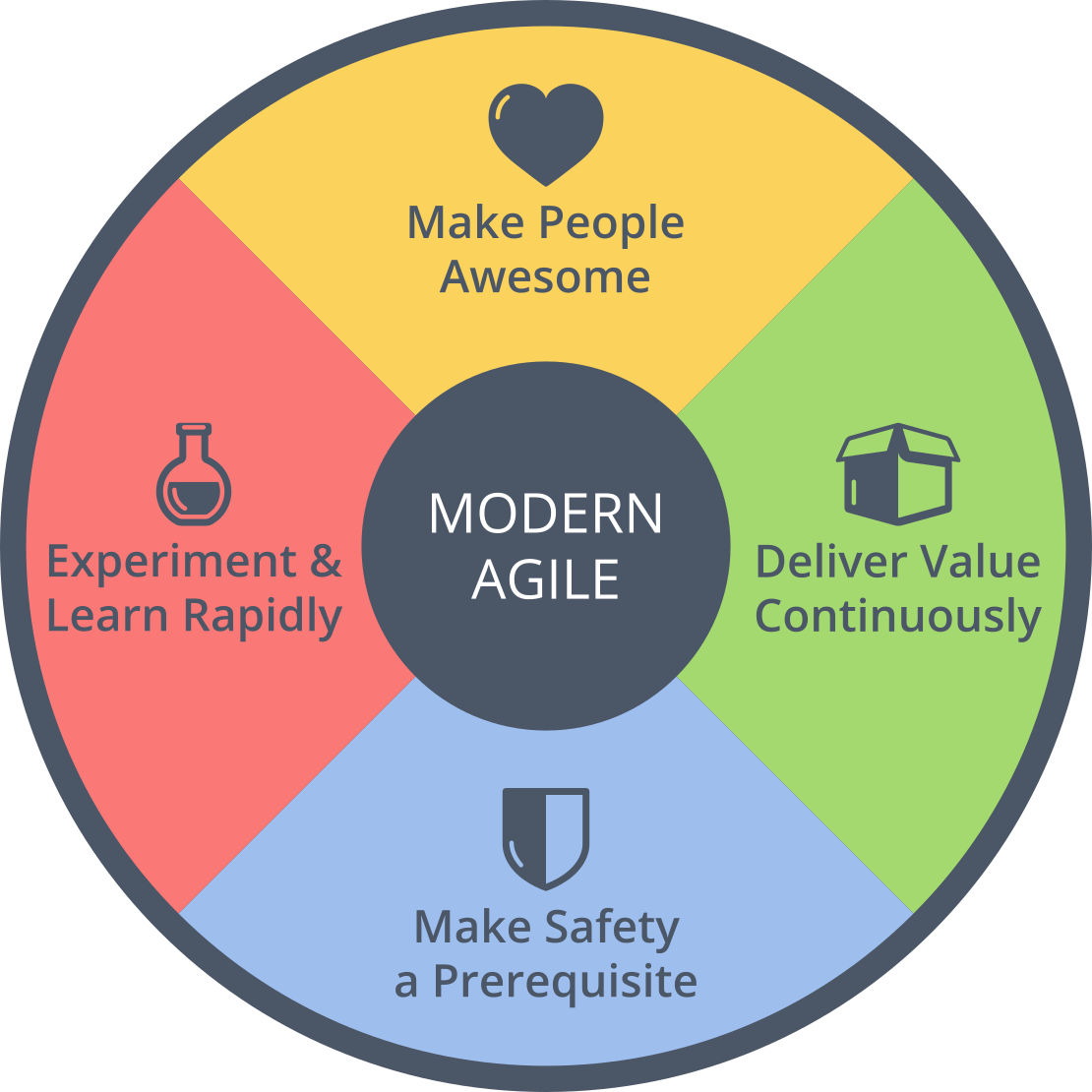

Read Time:
5
Minutes
Digital Transformation
December 1, 2025
Modern Agile: Rethinking Agility for Real World Delivery
Agile has transformed how we build software, but it hasn’t always kept pace with how we work. Many organisations today find themselves following Agile rituals without achieving Agile outcomes. Stand-ups happen, sprints complete, yet innovation stalls.
Modern Agile was born out of this frustration. It’s a return to first principles, focusing less on process compliance and more on creating environments where teams can learn, deliver and adapt continuously.
At Ntegra, we help organisations bridge the gap between theory and practice, using modern Agile ways of working to drive measurable outcomes that align delivery with business value.
Beyond Frameworks: Building a Culture of Agility
Where traditional Agile frameworks like Scrum and Kanban define ceremonies and roles, Modern Agile defines behaviours and intent. It enables teams to address the following key cultural diagnostics:
· Are we empowering people to do their best work?
· Are we continuously delivering value?
· Are we creating safety to innovate?
· Are we learning fast enough to stay relevant?
When embedded properly, Modern Agile becomes less as a development methodology and more as an organisation’s operating philosophy: a way to think, decide and lead. It distils Agile thinking into four guiding principles that prioritise people, safety, learning and value.
The Four Guiding Principles of Modern Agile

Principle 1: Make People Awesome
Agile has always claimed to be people-first, but Modern Agile demands it. It shifts focus from process efficiency to human effectiveness, enabling teams and users to succeed.
At Ntegra, we’ve seen this play out in our delivery teams who move from dependency-heavy project structures to autonomous, multidisciplinary squads. When teams have psychological safety and a clear purpose, productivity isn’t just higher, the work is more creative, ownership is deeper and outcomes align more closely with customer needs.
Principle 2: Deliver Value Continuously
Modern Agile encourages frequent delivery of usable increments, allowing teams to respond to feedback, reduce risk and waste, and adapt priorities based on evidence. This iterative approach ensures that value is delivered early and often, improving customer satisfaction and accelerating return on investment.
Through DevOps pipelines, cloud automation, and incremental release cycles, organisations can shorten feedback loops from months to days. At Ntegra, we help clients design delivery ecosystems that support this flow, integrating engineering, product and user insight into one adaptive development process.
Principle 3: Make Safety a Prerequisite
Psychological safety is essential for innovation. When teams feel safe to experiment, challenge assumptions, share ideas and admit mistakes, they’re more likely to take creative risks and learn from failure.
Modern Agile reframes safety as a prerequisite, not a privilege. In practice, this means leadership that listens, retrospectives that are honest, and metrics that reward learning as much as delivery. It promotes a culture where openness and trust are foundational. We’ve helped organisations implement feedback mechanisms that surface risk early, encourage transparency, and make improvement systemic rather than episodic.
Principle 4: Experiment and Learn Rapidly
In complex delivery environments, certainty is often the enemy of progress. Modern Agile favours rapid experimentation — testing ideas in controlled ways, learning fast and scaling what works.
Ntegra’s approach to agile ways of working integrates structured discovery phases, where hypotheses are tested before heavy investment begins. This ensures product direction is evidence-led and aligned with user needs, not just internal assumptions. Read more about the role of the discovery phase in Agile software development.
The Business Case for Modern Agile
Modern Agile translates its core principles into practical, outcome-driven project management strategies that enable teams to work smarter and deliver faster:
Iterative and Adaptive Delivery: Complex projects are broken down into manageable sprints, supported by continuous feedback loops that help teams refine direction and deliver incremental value. Adaptive planning ensures teams can pivot quickly as priorities shift or new insights emerge.
Empowered, Self-Organising Teams: Autonomy is a cornerstone of Modern Agile. By giving cross-functional teams ownership and encouraging collaboration, organisations enhance efficiency and responsiveness. Close engagement with customers ensures that solutions are informed by real-world needs, not assumptions.
Simplicity and Lean Workflows: Modern Agile promotes simplicity - eliminating unnecessary complexity to focus on what truly drives value. At Ntegra, we help clients design lean, flexible workflows that maintain structure where needed, enabling faster delivery without compromising quality.
Modern Agile ways of working offers competitive advantages in speed, quality and adaptability. It supports digital transformation by aligning technology delivery with business goals and user outcomes. While it originated in software development, its principles are now being adopted across industries from healthcare and education to finance and government.
As organisations seek more responsive and human-centred ways of working, Modern Agile is emerging as a preferred approach. Its emphasis on empowerment, experimentation, and continuous value makes it well-suited to the challenges of modern business.
Ready to Embrace Modern Agile?
Whether you're launching a new software project or rethinking how your teams work, Ntegra can help you adopt Modern Agile principles that drive real results. Our team of digital consultants help clients translate principles into practice, blending Agile coaching, DevOps enablement and leadership alignment. The result is delivery that’s not just faster, but smarter and more sustainable.
Authored by: Anusha Gurung | Technical Research Analyst at Ntegra
FAQs
Is Modern Agile a framework like Scrum or Kanban?
No. Modern Agile is a set of guiding principles, not a prescriptive framework. It can complement existing methodologies or stand alone.
How does Modern Agile compare to the original Agile Manifesto?
Modern Agile builds on the Agile Manifesto but simplifies its values into four core principles that are easier to apply across contexts.
Can non-technical teams use Modern Agile principles?
Absolutely. The principles are universal and can be applied to marketing, HR, operations and more.
What tools support Modern Agile in project management?
Tools like Jira, Trello and Miro can support Modern Agile workflows, especially when combined with practices like continuous delivery and user testing.
Are there certifications or training programmes for Modern Agile?
While Modern Agile itself doesn’t have formal certifications; many Agile training programmes incorporate its principles. Ntegra offers tailored workshops to help teams adopt Modern Agile effectively and stay on top of the technical curve.
Get in touch to learn how Ntegra can help you evolve your Agile practices into a truly modern way of working.

